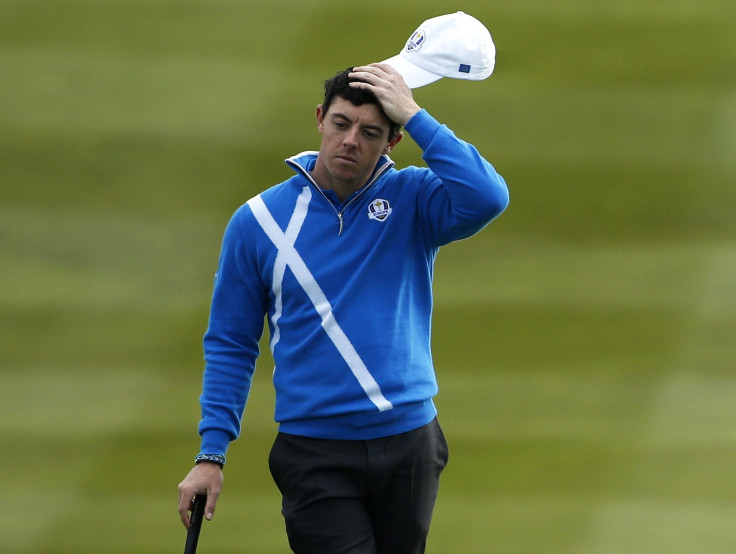Ryder Cup 2014: Is USA Team Lacking Tiger Woods, Star Power, Ready To Topple Rory McIlroy’s Europe?

Ever since Tiger Woods burst onto the scene in 1997, the Ryder Cup has had a clear narrative: the American stars against the European underdogs. For the 40th edition of what is arguably golf’s biggest event and surely its most captivating, the tables have turned. As Woods sits on the sidelines nursing a back injury, the star power is now in European blue. It is a wider worry for American golf, but, paradoxically, may enhance the USA’s prospects of winning a first Ryder Cup on foreign soil in 21 years.
Woods has dominated the golfing landscape for close to two decades, transforming how the sport is played and the people who watch. But it is now more than six years since he won a major, with his personal collapse and physical decline leaving a void that has yet to be filled -- at least on American shores. In January 2013, Nike took a reported $200 million gamble that a 23-year-old from Northern Ireland was the next golfing star to captivate the masses. After more than a little bump in the road, in the last few months that bet has started to show signs of paying off. Rory McIlroy won back-to-back Majors this summer and in so doing became the youngest man to own four Major titles since Woods in 2000. Many more are expected.
At Scotland’s Gleneagles course this week, it is McIlroy, not Woods, not any American, who is the undoubted star attraction. It is he who has the opposition team’s captain pinpointing him as a marked man. But is not just the fact that Europe now has golf’s undisputed No. 1 that signifies the shift in the balance of power. Europe counts among its team four of the world’s top six ranked players. Among the Americans, Phil Mickelson is the biggest name in the absence of Woods, but the 44-year-old is coming off a less than stellar year and his Ryder Cup record is nothing to write home about.
Yet his dismal winning percentage has already improved this week, having continued where he left off with partner Keegan Bradley two years ago in Medinah to help the U.S. take a lead after Friday’s first session. Could the U.S. in fact be strengthened by the underdog status? That certainly appears to be the belief of those competing for the stars and stripes. The pre-match verbal sparring has been dominated by U.S. team members, despite having a slightly higher average world ranking than their counterparts, reveling in their new role.
“The underdog role is one that's kind of fun to be honest with you,” top-ranked Team USA member Jim Furyk said. “When I went up against Nick Faldo in my first Ryder Cup, there wasn't one person that expected me to beat Nick Faldo that day. The underdog role is great. You have everything to win and nothing to lose. I never really looked at it as an intimidation. I looked at it as a great opportunity, and I think everyone else would look at it that way, as well.”
Having been completely dominated in the competition’s early years, particularly when they were just the United Kingdom and Ireland, Europe has won five of the last six Ryder Cups and seven of the last nine. Yet, rather than some sort of wider tendency toward team ethic among golfers within the continent of Europe compared to those in the single nation of the United States, could it simply be that it is easy to form team unity when you are battling against the odds?
In an overt sign of commitment to the cause, the American who currently looks the most likely to rival McIlroy in golf’s next generation -- and who finished second behind him in this year’s Open Championship and third in the PGA Championship -- Rickie Fowler, has had “USA” shaved into his head. Meanwhile, Mickelson, recoiling at the idea of a lack of team spirit among the U.S., pointed out that "Not only are we able to play together, we also don't litigate against each other.” It was a reference to McIlroy’s ongoing lawsuit against his former management agency, which has involved his lawyers requesting details of the contract held with the same company by his European teammate Graeme McDowell. It may have been lighthearted by Mickelson, but it was a clear sign of trying to poke at any cracks.
While McIlroy aims to fill the shoes of 14-time major winner Woods, in terms of the Ryder Cup Europe will be hoping his is a very different story. For all his incredible individual achievements, no American player in history has lost more Ryder Cup matches than Woods. It is an event he has appeared to view with indifference rather than relish, far behind Major titles in his list of priorities. The U.S. has lost six of the seven contests Woods has played in. The last time it won was in 2008, when Woods, like now, was injured.
McIlroy, too, has been accused of not taking the Ryder Cup with the seriousness many feel it warrants. In 2009, a year before he first participated, he dubbed the event an “exhibition.” Two years ago he only just arrived on the tee in time on the final day having spent the morning sitting around his Chicago hotel room after a reported time-zone mix up. His love for the event appears to have grown, but if McIlroy fails to show up at Gleneagles with the play that has catapulted him to the top of the golfing world, it could well be the U.S. defeating Europe and its own underdog game.
© Copyright IBTimes 2025. All rights reserved.





















